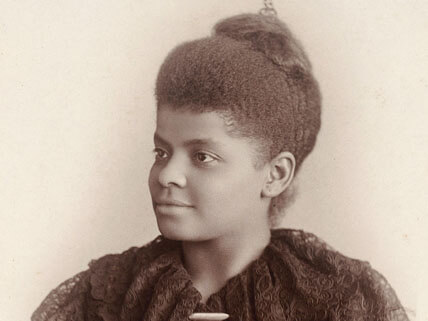Publisher and journalist Ida B. Wells, ca. 1893
Ida B. Wells was a pioneer of investigative journalism and a brave civil rights crusader who helped expose the brutality of lynching in the United States. In May, nearly 90 years after her death, Wells (also known by Wells-Barnett) was awarded a Pulitzer Prize citation. The journalism prize commended Wells for her “outstanding and courageous reporting on the horrific and vicious violence against African Americans in the era of lynchings.” The citation comes with a $50,000 bequest to support Wells’s legacy.
Born into slavery in Mississippi during the Civil War, Ida B. Wells was freed by Abraham Lincoln’s Emancipation Proclamation. Orphaned at age 15 by a the yellow fever epidemic, she moved with siblings to Memphis, Tennessee, and soon became a newspaper reporter. By age 30, she was co-owner and editor of the Free Speech and Headlight. Wells achieved fame for her investigations of lynching, the illegal killing of a person by a mob—especially the murder of black men in the American South. Her interest was motivated by personal tragedy: the lynching of three fellow African Americans in Memphis by a mob of white men.
Wells traveled for months through the southern states to uncover the truth behind hundreds of lynchings. She relentlessly researched court records, analyzed data, and conducted in-person interviews. Her published reports exposed how lynching was used by white citizens to terrorize and oppress African Americans. Her writing countered the stereotypes about black men raping white women. Wells published her findings in pamphlets titled Southern Horrors (1892) and The Red Record (1895), later turned into books.
Wells’s work was met with a backlash from white supremacists, who repeatedly threatened her life. They plundered her newspaper offices and destroyed her printing presses, forcing her to flee Memphis. In Chicago, Wells continued her anti-lynching advocacy. She also was a cofounder of the National Association for the Advancement of Colored People. She started the city’s first African American women’s club and its first kindergarten for black children. She also helped organize boycotts, promoted women’s suffrage, and actively opposed segregation. Wells directed a settlement house on Chicago’s South Side that assisted African Americans with social services and housing. Besides these accomplishments, Ida B’s legacy includes being the “Rosa Parks” of her day. In 1884 she was kicked out of a first-class ladies’ train car when she refused the conductor’s order to move to a segregated carriage.
Image credit: © Hi-Story/Alamy
Related Links:
- Pulitzers Honor Ida B. Wells, an Early Pioneer of Investigative Journalism and Civil Rights Icon
Brief assessment of Ida B. Wells’s legacy in the history of investigative journalism and the civil rights movement.
(Source: Poynter Institute, May 4, 2020) - When Ida B. Wells Took on Lynching, Threats Forced Her to Leave Memphis
A glimpse of the tumultuous life and journalistic career of Ida B. Wells.
(Source: History.com, updated February 27, 2019) - Ida B. Wells’s Pulitzer—Both Too Late And Right On Time
Opinion piece on the timely—and overdue—Pulitzer award to Ida B. Wells.
(Source: ThyBlackMan, May 12, 2020) - “The Only Thing She Really Had Was the Truth”
Newspaper report from Chicago, the city Ida B. Wells made home.
(Source: Chicago Sun Times, May 4, 2020) - Ida B. Wells Receives Posthumous Pulitzer Prize
This international-facing website hosted by the Bureau of Global Public Affairs of the U.S. Department of State honors Ida B. Wells.
(Source: ShareAmerica, May 8, 2020)




